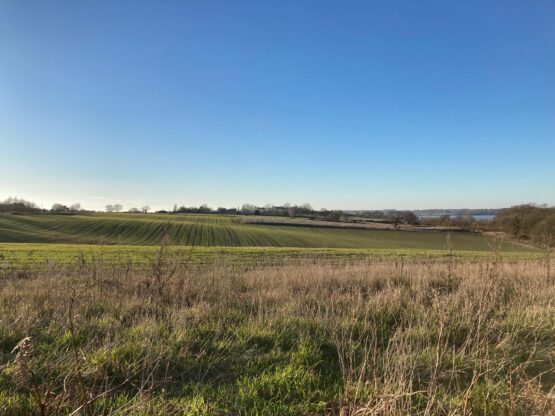Farming in Protected Landscapes

If you’re a farmer or land manager, you can get funding to support and improve the Suffolk & Essex Coast & Heaths National Landscape through the national Farming in Protected Landscapes grant programme (FiPL).
The programme funds projects that:
- Support nature recovery
- Mitigate the impacts of climate change
- Provide opportunities for people to discover, enjoy and understand the landscape and its cultural heritage
- Protect or improve the quality and character of the landscape or place
Farming in Protected Landscapes is a competitive programme which will run until March 2026. Applications will close sooner if all funding is allocated.
Who can apply
The Farming in Protected Landscapes programme is open to all farmers and land managers within Suffolk & Essex Coast & Heaths National Landscape. This includes farmers and land managers from the public, private and charity sector.
The programme is also open to farmers and land managers on land outside of these National Landscapes. To be eligible, the project must benefit the National Landscape or the National Landscape body’s objectives, or partnership initiatives.
Contact the local FiPL team via [email protected] or 01502 674 630 for advice about whether your land or project is eligible.
To apply you must:
- Manage all the land included in the application
- Have control of all the activities you would like to do
- Or you must have written consent from all parties who manage and control the land
Other organisations and individuals can apply when collaborating with a farmer or land manager, or in support of a farmer or group of farmers. Common land is eligible for this funding. You can apply as a landowner with sole rights or as a group of commoners acting together.
What the programme will pay for
The Farming in Protected Landscapes Programme will pay for projects that, in the opinion of the Local Assessment Panel (see ‘Application assessment’ below) provide value for money and meet at least one of the outcomes listed below, under four themes.
1. Climate outcomes
- More carbon is stored and/or sequestered
- Flood risk is reduced
- Farmers, land managers and the public better understand what different habitats and land uses can store carbon and reduce carbon emissions
- The landscape is more resilient to climate change
2. Nature outcomes
- There is a greater area of habitat improved for biodiversity
- There is an increase in biodiversity
- There is greater connectivity between habitats
- Existing habitat is better managed
3. People outcomes
- There are more opportunities for people to explore, enjoy and understand the landscape
- There are more opportunities for more diverse audiences to explore, enjoy and understand the landscape
- There is greater public engagement in land management, such as through volunteering
4. Place outcomes
- The quality and character of the landscape is reinforced or enhanced
- Historic structures and features are conserved, enhanced or interpreted more effectively
- There is an increase in farm business resilience
The programme might fund projects:
- Promoting connectivity between habitats
- Training farmers, land managers or other stakeholders
- Replacing stiles with gates on public footpaths, for easier access
- Conserving historic features on a farm, such as lime kilns or lead mining heritage
- That support a locally branded food initiative, promoting the links between the product and the landscape in which it is produced
- That take action to reduce carbon emissions on a farm
- Gathering data and evidence to help inform conservation and farming practice
How much funding you can get
You could get up to 100% of the costs of a project if you will not make a commercial gain from it. If you will benefit commercially from a project, then the programme will fund a proportion of the costs. The amount will depend on how much the project will benefit your business.
The programme will work alongside, not in competition with, Defra’s existing and new schemes to add value where it’s most needed. Your protected landscape team will tell you if a potential project can be rewarded through other schemes.
You can still get funding through the programme if you are in an agri-environment scheme, as long as you’re not paid twice for the same work.
If your project is the same as a Countryside Stewardship (CS) activity, you will be paid the same as the CS rate. If your project is not the same as a CS activity, the protected landscape team will offer funding on the estimated costs
What you must maintain after the programme
You will not need to maintain any natural, cultural and access activities you deliver as part of the programme after your agreement period ends. You must maintain capital infrastructure like fences, gates or restored buildings for 5 years from the completion date. You must maintain machinery assets like brush harvesters for grassland restoration for 5 years from the purchase date.
How to apply
Before you apply, you should discuss your project with the local FiPL team via [email protected] or 01502 674630.
You can apply until February 2026. Applications will close sooner if all funding is allocated. Your project must end by February 28, 2026.
How applications will be assessed
Your application will be scored:
- 40% for project outcomes – climate, nature, people and place
- 20% for value for money
- 20% for how sustainable the project is or the legacy it will leave
- 20% for how likely you are to carry out the project
Applications for over £10,000 will be judged by a local assessment panel. The membership of the local assessment panel for the Suffolk & Essex Coast & Heaths National Landscape is:
- Nigel Chapman – Local Assessment Panel chair
- Simon Amstutz – National Landscape Manager
- Kim Pearce – Natural England
- Robin Thorogood – Farmer
- Geoffrey Probert – Farmer
- David Lewis – Farmer
- Will Akast – Catchment Delivery Manager, Environment Agency
- Sam Hanks – Wilder Landscapes Manager, Suffolk Wildlife Trust
- David Falk – Green Access Manager, Suffolk County Council
- Edward Martin – Landscape Archaeologist
- Richard Wrinch – Farmer
- Rob Raven – Farmer
- Mariah Ballam – Farming representative
- Nick Shuttleworth – Rural Community Council of Essex
- Rob Wise – National Farmers Union
- Vacant - Rural Payments Agency
Applications for less than £10,000 will be scored by the National Landscapes team manager Simon Amstutz.
